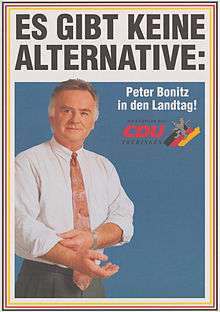There is no alternative

Example of a campaign advertising material of the CDU for the 1994 election for the Landtag of Thuringia.
There is no alternative (shortened as TINA) was a slogan often used by the Conservative British Prime Minister Margaret Thatcher. In economics, politics, and political economy, it has come to mean that "there is no alternative" to economic liberalism—that free markets, free trade, and capitalist globalization are the best or the only way for modern societies to develop.
The phrase was used to signify that global capitalism is the only system possible and that debate about this is over. One commenter characterized the meaning of the slogan as "Globalized capitalism, so called free-markets and free trade were the best ways to build wealth, distribute services and grow a society’s economy. Deregulation’s good, if not God."[1] However, as is usually the case with propaganda there is little substance behind this statement. Alternatives exist, such as the social market economy which unites the freedom of choice provided by capitalism with the societal and social responsibility of socialism in order to create a utility maximising alternative.
The phrase may be traced to its emphatic use by the nineteenth-century classical liberal thinker Herbert Spencer.[2]
Cabinet minister Norman St John-Stevas, one of the leading "wets", nicknamed Thatcher "Tina".
In the early 1990s, Francis Fukuyama wrote a book called The End of History and the Last Man, which in a similar vein argued that liberal democracy had triumphed over communism and that the historic struggle between political systems was over (although there could still be future events).
See also
- Economic system
- Privatization
- Pensée unique
- Thatcherism
- Washington Consensus
- There Is No Alternative: Why Margaret Thatcher Matters - biography of Margaret Thatcher.
References
- ↑ Laura, Flanders (April 12, 2013). "At Thatcher’s Funeral, Bury TINA, Too". The Nation.
- ↑ Social Statics (1851), pp 42, 307.
External links
- Margaret Thatcher's key speeches containing the phrase "there is no alternative" or similar
- TINA vs. LOIS: the small-mart revolution for a summary of the alternative from the Autumn 2009 issue of Sockeye Magazine